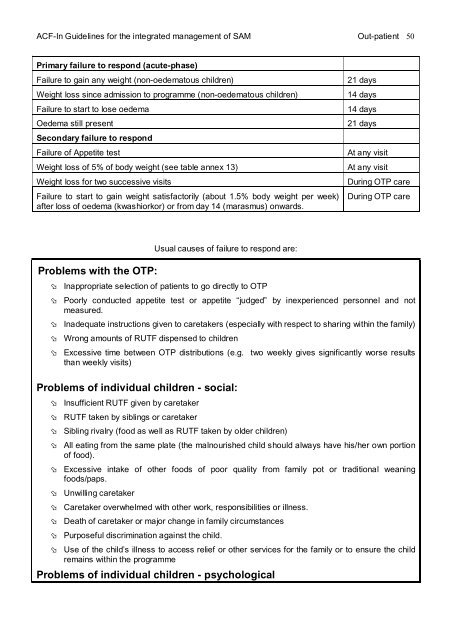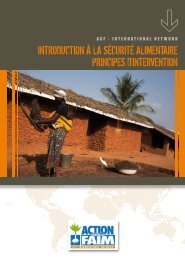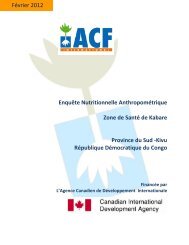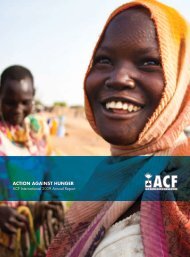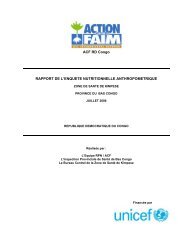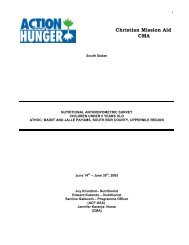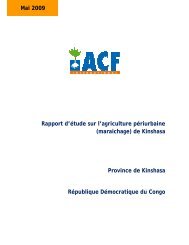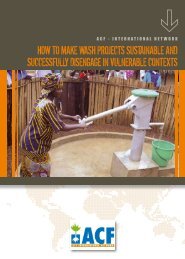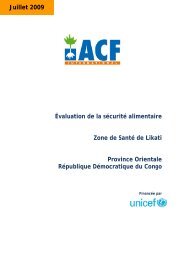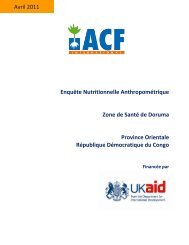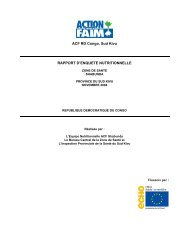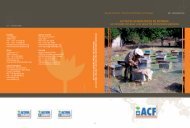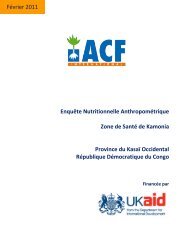guidelines for the integrated management of severe acute malnutrition
guidelines for the integrated management of severe acute malnutrition
guidelines for the integrated management of severe acute malnutrition
Create successful ePaper yourself
Turn your PDF publications into a flip-book with our unique Google optimized e-Paper software.
ACF-In Guidelines <strong>for</strong> <strong>the</strong> <strong>integrated</strong> <strong>management</strong> <strong>of</strong> SAM Out-patient 50<br />
Primary failure to respond (<strong>acute</strong>-phase)<br />
Failure to gain any weight (non-oedematous children) 21 days<br />
Weight loss since admission to programme (non-oedematous children) 14 days<br />
Failure to start to lose oedema 14 days<br />
Oedema still present 21 days<br />
Secondary failure to respond<br />
Failure <strong>of</strong> Appetite test At any visit<br />
Weight loss <strong>of</strong> 5% <strong>of</strong> body weight (see table annex 13) At any visit<br />
Weight loss <strong>for</strong> two successive visits During OTP care<br />
Failure to start to gain weight satisfactorily (about 1.5% body weight per week)<br />
after loss <strong>of</strong> oedema (kwashiorkor) or from day 14 (marasmus) onwards.<br />
Problems with <strong>the</strong> OTP:<br />
Usual causes <strong>of</strong> failure to respond are:<br />
� Inappropriate selection <strong>of</strong> patients to go directly to OTP<br />
During OTP care<br />
� Poorly conducted appetite test or appetite “judged” by inexperienced personnel and not<br />
measured.<br />
� Inadequate instructions given to caretakers (especially with respect to sharing within <strong>the</strong> family)<br />
� Wrong amounts <strong>of</strong> RUTF dispensed to children<br />
� Excessive time between OTP distributions (e.g. two weekly gives significantly worse results<br />
than weekly visits)<br />
Problems <strong>of</strong> individual children - social:<br />
� Insufficient RUTF given by caretaker<br />
� RUTF taken by siblings or caretaker<br />
� Sibling rivalry (food as well as RUTF taken by older children)<br />
� All eating from <strong>the</strong> same plate (<strong>the</strong> malnourished child should always have his/her own portion<br />
<strong>of</strong> food).<br />
� Excessive intake <strong>of</strong> o<strong>the</strong>r foods <strong>of</strong> poor quality from family pot or traditional weaning<br />
foods/paps.<br />
� Unwilling caretaker<br />
� Caretaker overwhelmed with o<strong>the</strong>r work, responsibilities or illness.<br />
� Death <strong>of</strong> caretaker or major change in family circumstances<br />
� Purposeful discrimination against <strong>the</strong> child.<br />
� Use <strong>of</strong> <strong>the</strong> child’s illness to access relief or o<strong>the</strong>r services <strong>for</strong> <strong>the</strong> family or to ensure <strong>the</strong> child<br />
remains within <strong>the</strong> programme<br />
Problems <strong>of</strong> individual children - psychological


